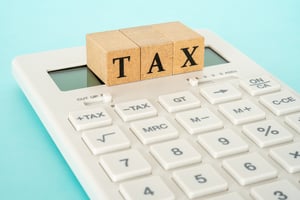
Filing a Chapter 13 bankruptcy is a helpful tool to deal with overwhelming debt. A Chapter 13 bankruptcy allows a debtor to pay as much as they can afford in a three to five year repayment plan. After three to five years, a debtor will receive a bankruptcy discharge of their remaining debts. How much a debtor pays each month, is impacted by their monthly expenses and the deductions from their paystubs. Federal exemptions can protect certain assets, including tax refunds, in bankruptcy.
.
Tax refunds are considered part of the bankruptcy estate and must be disclosed. The IRS treats the money owed to them similarly to money in a bank account when considering bankruptcy proceedings.
UNDERSTANDING DISPOSABLE INCOME AND ITS IMPACT ON PAYMENTS
A debtor must pay all of their disposable income each month as a payment to their creditors in a Chapter 13 bankruptcy. A debtor’s disposable income is calculated by taking their gross income and subtracting their deductions, including taxes, and all of their other monthly expenses. Disposable income is the amount that remains.
The more taxes that are withheld from a debtor’s paycheck, the lower the amount of disposable income that is available to pay creditors. The benefit of increasing or maximizing one’s tax withholdings, is that it makes a debtor’s monthly Chapter 13 payments lower and more affordable.
However, the downside is that even though a debtor’s monthly payment may be lower, this could result in a large tax refund from the federal and state government at the end of the year. This tax refund, along with any other assets that don't fit within the other exemption categories, can be protected using exemptions.
TAX REFUNDS AND CHAPTER 13: WHAT YOU NEED TO KNOW
When a debtor receives a large tax refund, they may need to turn over a portion of the refund to the bankruptcy trustee as an additional Chapter 13 plan payment. The bankruptcy trustee will use that refund portion to pay the debtor’s creditors. In Minnesota, the Chapter 13 trustee’s office allows a debtor to file jointly with their spouse and keep $2,000 of their tax refund for themselves. If the debtor is a single tax filer, the Chapter 13 trustee’s office will allow the debtor to keep $1,200.
During the payment plan in Chapter 13 bankruptcy, the estate includes all the tax refunds received, and debtors are advised on ways to keep future refunds from the trustee.
In addition to this, the Chapter 13 trustee’s office will also allow the debtor to keep any portion of their tax refund that comes from Minnesota working family credit or earned income credit. Anything else will need to be turned over to the bankruptcy trustee.
ADJUSTING WITHHOLDINGS: STRIKING THE RIGHT BALANCE
Since some debtors would rather keep their tax refunds during a Chapter 13 bankruptcy, those debtors may opt to increase their tax withholdings from their paystubs, so that they do not end up with a large refund they will need to turnover to the bankruptcy trustee. In some cases, a debtor’s tax withholdings from their paystubs may be too low. This is a common issue, typically for high income earners, who have a large amount of tax debt prior to filing a Chapter 13 bankruptcy.
The trustee's office policies can significantly impact decisions on adjusting tax withholdings, as they dictate how tax refunds are handled and turned over during the bankruptcy process.
For these individuals, a Chapter 13 bankruptcy can greatly help them by allowing them to pay their taxes over a three-five year plan. However, since a Chapter 13 bankruptcy only allows debtors to pay and discharge certain tax debt that was incurred before their bankruptcy case was filed, these individuals are best advised to increase their tax withholdings after they file their Chapter 13 case. This ensures that they do not continue to incur large debt at the end of each year while they are in the bankruptcy.
Tax withholdings have a large impact on a debtor’s monthly Chapter 13 payments and also has a large impact on how much will have to go to creditors. It will also impact the amount of tax refund a debtor receives and has to turnover to the bankruptcy trustee throughout the Chapter 13 bankruptcy. In order to ensure that a debtor’s tax withholdings are adjusted properly to maximize the benefit to the debtor in their Chapter 13 plan, one should consult with an experienced bankruptcy attorney.
THE UNIQUE CHALLENGES OF 1099 INCOME
Real estate and insurance agents often work as independent contractors, receiving 1099 income instead of traditional W-2 wages. This can create unique challenges in bankruptcy, as 1099 income can fluctuate significantly from month to month or year to year. Accurately documenting your income and expenses is crucial for a successful bankruptcy filing.
This includes gathering income statements, tax returns, and records of any business expenses. A bankruptcy attorney can guide you through this process, ensuring your financial picture is presented accurately to the court, which will help determine your eligibility for different bankruptcy chapters and repayment plans.
COMMUNICATING WITH CLIENTS AND COLLEAGUES
Bankruptcy can raise concerns for clients and colleagues who rely on your professional services. Open communication is key to maintaining trust and managing expectations. Proactively addressing any concerns they may have about your ability to fulfill your professional obligations demonstrates your commitment to their needs.
Explain the situation honestly and emphasize that bankruptcy is a legal process to resolve financial challenges, not a reflection of your skills or dedication to your clients. Reassurance and transparency can go a long way in preserving your reputation and fostering continued support.
LIFE AFTER BANKRUPTCY: REBUILDING YOUR FINANCIAL FOUNDATION
Bankruptcy is a tool for a fresh start, not the end of your financial journey. After completing the process, focus on rebuilding your credit by establishing responsible financial habits. Pay bills on time, utilize secured credit cards, and consider becoming an authorized user on a trusted friend or family member's card. Create a realistic budget, track your spending, and seek financial counseling if needed.
Explore opportunities to increase your income, such as diversifying your services or taking on additional clients. Remember, with dedication and a well-thought-out plan, you can emerge from bankruptcy with a stronger financial foundation and a brighter future.
TIMING IS EVERYTHING: WHEN TO ADJUST YOUR WITHHOLDINGS
The optimal time to adjust your tax withholdings during a Chapter 13 bankruptcy can vary depending on your individual circumstances. It's generally advisable to make adjustments early in your case, ideally soon after your repayment plan is confirmed.
This allows you to maximize the benefits of lower monthly payments throughout the duration of your plan. However, it's never too late to make adjustments if you notice your withholdings are not aligned with your financial needs.
THE ROLE OF THE BANKRUPTCY TRUSTEE IN TAX MATTERS
The Chapter 13 trustee plays a key role in overseeing your tax situation during bankruptcy. They monitor your tax returns, ensure proper payment of priority tax debts, and may require you to turn over a portion of your tax refund if it exceeds the allowable limits.
It's essential to maintain open communication with your trustee and promptly notify them of any changes in your income or tax withholdings.
BEYOND BANKRUPTCY: PLANNING FOR FUTURE TAX OBLIGATIONS
While Chapter 13 bankruptcy provides a framework for addressing existing tax debts, it's important to plan for future tax obligations. Once your bankruptcy is discharged, you'll be responsible for any new taxes incurred. Developing a budget that includes a realistic estimate of your tax liability can help you avoid future financial difficulties and ensure ongoing compliance with tax laws.
CALL NOW FOR A FREE STRATEGY SESSION FROM A MN BANKRUPTCY LAWYER AT LIFEBACK LAW FIRM
Come see us at our new office in St. Paul, Minnesota, or come visit us at LifeBackLaw.com!





